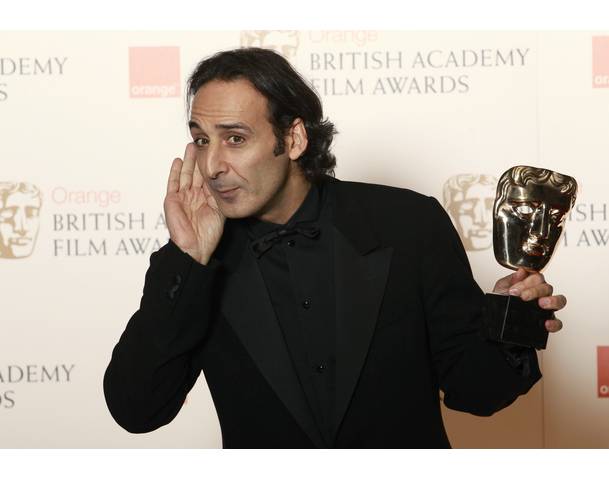 Robert G here from Sketchy Details wishing a Happy Birthday to the most in demand film composer of our time.
Robert G here from Sketchy Details wishing a Happy Birthday to the most in demand film composer of our time.
Can you believe that Alexandre Desplat has scored 128 separate film and television projects since 1985? How about how a year hasn't gone by since 1991 where he didn't score at least three different TV or film productions? He has had quite the successful career in France and has started to work consistently in America in the past eight or so years.
Desplat has been nominated for Best Original Score four times at the Academy Awards: The Queen, The Curious Case of Benjamin Button, Fantastic Mr. Fox, and The King's Speech. He's clearly doing something right to get the Music Branch's attention. His work is especially noticeable for not being the super flashy film scoring that demands attention. He does what needs to be done to set the right tone and lets the film be the focus.
Indeed, every year he lost the Oscar, he lost to a film with a far flashier or more pronounced score...
Gustavo Santaolalla had the instantly recognizable acoustic guitar sequence in Babel. A.R. Rahman brought his Bollywood flair to Hollywood with Slumdog Millionaire. Michael Giacchino had that sweeping old-fashioned waltz in Up. And Trent Reznor and Atticus Ross blew everyone away with their moody use of synths and keyboards in The Social Network. Someone like Desplat doesn't stand a chance against scores that steal attention from the film.
Desplat is the kind of composer I aspire to be. He has a distinct sound that is instantly recognizable but it is always appropriate to the context of the film. His music tends to be a little bit sentimental with a bit of a dark edge. He favors traditional film orchestra instrumentation--piano, strings, brass, woodwinds, orchestral percussion--and always establishes a recurring theme. This little string of melody will be spun as many ways as possible throughout the film. It's never distracting. That is his greatest strength. You know a film score is working right if it helps the story and visuals progress without drawing attention to itself. It's designed to establish a tone or mood that only music can accomplish.
The first time I really took notice of Alexandre Desplat was in his score to the Nicole Kidman film Birth. Aside from being a severely underrated, underseen, and underappreciated film, Birth is one of the rare times where Desplat sets up cheerful theme. He can spin it dark in an instant to match the more serious subject matter. That's not a challenge. This score is simultaneously unique in his career and instantly recognizable as Desplat's work.
This year, Alexandre Desplat is responsible for the original score in four films: The Tree of Life, Harry Potter and the Deathly Hallows: Part 2 (he added some really nice touches but was mostly working off of John Williams' original score in the first film), A Better Life (a tiny film that I wouldn't expect to get noticed for its music), and The Ides of March.
The Tree of Life features some really beautiful original scoring. The problem is that the final edit of the film uses many other composers for specific stylistic reasons. The most recognizable is Mahler's "Symphony No. 1," used in the opening scene and a crucial scene later on. While I give credit to Desplat for finding a way to connect all of these disparate samplings of existing music together with his atmospheric score, I will not be surprised if the Academy declares him ineligible for Best Original Score for this film. There's just so much music he didn't write in it and it's all used in far more important scenes than his original score. Still, it is a lovely score. You can listen to 30 seconds samples in this video.
I have a feeling that if Alexandre Desplat is going to play into the Oscar race this year, it will be for the upcoming The Ides of March. We don't know a lot about the film yet. What we do know is that it's a political drama, which is always an invitation to do dark, lush, moody themes that typically pick up at the tail end of all major dramatic scenes. It's probably the flashiest way Desplat's music could be used in a film. You can notice something similar with how his score was mixed into last year's The Ghost Writer. It could just be that he needs a film to push his music to the forefront to break through from regular nominee to Academy Award winner.
As vivi ferriari pointed out in the comments, Desplat is also scoring Roman Polanski's Carnage. If the Academy goes big on that film, Desplat could easily get swept up.
Here's to Alexandre Desplat's 50th Birthday. May he continue to take pride in his craft and deliver just what a film needs with each project he takes on.